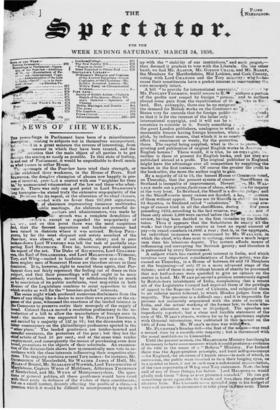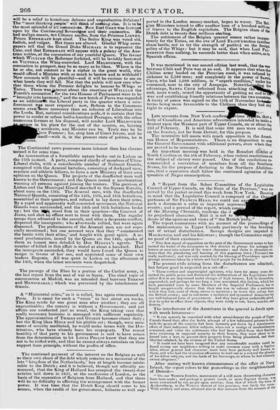NEWS OF 11-1E WEEK.
Tgo proceedings in Parliament have been of a miscellaneous description; :elating to subjects not in themselves unimportant, • Ire . :ter el in a great measure the reverse of interesting, from . 4.- manner in which they have been treated, and the aoriction that the main object of all parties is to get ireaerr the session as erisify as possible. In this state of feeling, in and out of Parliament, it would be unprofitable to dwell much OD what passes in either House.
Tls Jpaonesits of the Poor-law have tried their strength, or Latter exhibited their weakness, in the House of Peers. Earl &outwit, the doughty champion of abuses now happily in pro- cess of removal, proveked a contest with one "mightier far than he," by unmeasured vituperation of the law and those who admi- „Mater it. There was only one good point in Lord STANHOPE'S Aing harangue—he stated truly the extensive unpopularity of the Petitions for its repeal, or the alteration of' its chief clauses, sssoted with no fewer than 267,000 signatures, of chairmen representing immense multitudes iublic meetings. An elaborate and powerful de- authors and administrators, was made by al; speech was a complete demolition of .ut es s, except us regarded the unpopularity of iao ar, and on this point there was the most suspicious het, that the fiercest opposition and loudest clamour had been raised in districts where it was untried. Bishop Pi-tu- ners, by far the most eloquent and astute assailant of the Poor-law, was absent, or if not absent, silent; and to poor broken-down Lord WYNFORD was left the task of partially sup- porting Earl STANHOPE. Even he, however, protested against the repeal of the act. The Duke of RICHMOND, Lord CoLcitas- UR, the Earl of STRADBROIER, and Lord MELBOURNE—Trimmer, Tory, and Whig—united in laudation of the new syetsm. The three mighty men of Somerset House are therefore secure in their dominion. It is, however, right to remind them again, that Par- liament does not fairly represent the feeling out of doors on this subject, and that their proceedings will and ought to be more jealously watched, because, moved by selfishness fully as much as by conviction of its public usefulness, vast majorities in both Houses of the Legislature combine to scout opposition to that which works so well for the” breeches-pocket" interests.
The same night which produced numerous disclaimers from the Peers of any thing like a desire to save their own purses at the ex- pense of the poor, witnessed the exertions of the landed interest in the Commons to preserve entire their monopoly of the supply of bread. Colonel SEALE moved a resolution preliminary to the in- troduction of a bill to allow the manufacture of foreign corn in bond: the motion was supported by Mr. POULETT THOMSON, sad carried by a majority of 127...to 92; but the discussion was a bitter commentary on the philanthropic professions sported in the 'other place." The landed gentlemen are tender-hearted and nierciful creatures, the protectors of the poor ; but they tax the ahisf article of food 56 per cent., and at the same time render employment, and consequently the means of purchasing even dear bread, precarious to the objects of their solicitude. An examina- tion of the division-lists shows how systematically men vote in ac- cordance with the class-interests influencing their respective elec- tions. 'I he majority contains several Tory names : for instance, Mr. GRIMSOITCH of Macclesfield, Sir WALTER JAMES of Hull, Mr. MILE2 of Bristol, Mr. Sc ARLETT of Norwich, Lord TEIGNMOUTH of Narylebone, Captain Woon of Middlesex, Alderman THOMPSON Of Sunderland, and Mr. WYNN of Montgomeryshire. On ques- tions of general politics, all these gentlemen would have voted pith their party in defiance of the wishes of their constituents ; but on a small matter, directly affecting the profits of a class,—a question which it would be difficult to misrepresent by mixing it up with the " stabiqty of our institutions," and such jargon — they deemed it prudent to vote with the Liberals. On the other hand, we find Mr. ALSTON, Mr. Gilmore CRAIG, and Mr. BARRY, the Members for Hertfordshire. Mid Lothian, and Cork County, voting with Lord CHANDOS and the Tory minority: why ?—be- cause their constituents have a pocket interest in mairraisinp rtiti corn monopoly intact.
A bill " to provide for international copyrielit," i• • , • . • •-! hy Mr. POULETT THOMSON, would secure to B. •• authors a portion of the profits now reaped by foreign " pirates," and to authors abroad some gain from the republication of tle apiv,-srks in En-.- -
land. But, unhappily, there can be no reciprocii •••••• . the demand for British works on the Continent an States very far exceeds that for foreign public-tie' . so that it is for the interest of the latter only t ) . of
international copyright, and it will not be e. .sesica
countries to coincide in it. Surely something ,
the great London publishers, analogous to what di mercantile houses having foreign branches, whicii .- plish, by indirect means, that which it is so nearly effect by enactment or treaty, for the protectioo thors. The capital being supplied, what is three to prevel printing and publication of original English works in Airxrica English houses ? There would, it is true, be no copy right; ei. neither is there at present for English books, and yet they are published abroad at a profit. The original publisher in England might have the advantage over all competitors by supplying the market in the first instance. Of course the greater the profit to the bookseller, the more the author ought to gain.
By a majority of 53 to 19, the honest House sit Commons voted. on Thursday, that the present system of sinecur, iherifflotns in Scotland is incapable of improvement. Neverti es. Mr. WAL- LACE made out a prima fade case of abuse, which. ',die for inquiry at the very least. In Scotland, the Sheriff is a district judge; and in the Sheriff-courts many causes are decided, a tart, -,;yirtion of them without appeal. There are 30 Sheriffs in chit.' no have 52 deputies, in Scotland called "substitutes." Th. •aitill ave- rage of causes tried in all the sheriffdom', during 1. five years preceding 1833, according to the last returns, wei_.„r o ; and these only about 2,000 were carried before the SiWas er zo.,e. Coe review, having been decided in the first instadee by the Substi- tutes. Thus it appears that the Substitutes do nearly el the work: but their principals receive at least an equal amount of pay—in round numbers 14,000/. a year ; that is, in the aggregate, for individual instances were mentioned by Mr. WALLACE, in which the chief, who does next to nothing, receives a much larger sum than his laborious deputy. The system affords means of influencing and corrupting the Scottish gentry ; and therefore it is patronized by every Government. A subject which has excited great interest in India, and which involves very important considerations of Indian policy, was dis- cussed on Thursday, in a House of between 60 and 70 Members at the beginning—of only 27 in a more advanced stage of the debate; anti of these it may without breach of charity be presumed that not half-a-dozen were qualified to give an opinion on the matter in hand. Mr. WARD presented a petition numerously signed by British-born inhabitants of India, complaining that a recent act of the Legislative Council had deprived them of the privilege of' appeal to the Supreme Court of Calcutta, and subjected them to an inferior native tribunal, in which Ilindoo judges form the majority. The question is a difficult one; and it is impossible for persons not intimately acquainted with the state of society in India, and the actual working of the former law, to decide who- thee the alteration was wise or ill-judged. The speeches are imperfectly reported; but a clear and forcible statement of the case of Mr. WARD'S clients, written for us by a gentleman replete with Oriental information, was published in thisjiLirnal on the
10th of June last. Mr. WARD'S motion was withd n.
Mr. PLumerites Sunday-bill—the first of the seaeon—was read a second time by a coneiderable majority ; but is threatened with the usual mutilations in Committee.
Until the present session, the MELBOURNE Ministry has thought it necessary to have some measure which it could produce as evidence of its title to the name of It " Reform" Ministry. For Ireland there was the Appropriation principle, and local self-government —for England, I lie abet Dion of Church rates—to each of which, in sucees-ion, the public were directed to turn their longing eyes, as to a SN label at least, it not in each case a substantial malt oestation, of the vast superiorita of W big over Tory statesmen. Now. the less said of any of those things, toe better. Lord MELBOURNE would gladly sink them " deep as ever plummet sounded." Ile has got seinething inure agreeable lui. ft heals and foes_sken the ghosts of abortive bills. The Ceionatt at—a splendid:deco in his huilfeet of ways and means—is an tam iicel to Italie piaci itatine next. here
will be a relief to humdrum debates and unproductive dielsions! The "most thinking people" will think of nothing else. It is to be the most splendid of all coronations. Poor Earl was frowned upon by the Continental Sovereigns- and their emissaries. He had malign sneers, not Circean smires, from the Princess LIEYKN. Prince ESTERHAZY kept aloof. The Sailor King was voted old, foolish, and vulgar. But times are altered. Gleeful Whig news- papera tell that tbe Grand Duke MICHAEL is to represent the Czar, and that ESTERHAZY will appear with a galaxy of the Aus- trian nobles, at the coronation of our youthful Queen. The favour which WILLIAM the Reformer forfeited, will be lavishly bestowed on VICTORIA the Whig-encircled. Lord MELBOURNE, with the coronation in prospect, may be as saucy as he likes. Where is the be or she, not content to be a cipher in the great world, who would offend a Minister with so much to bestow and to withhold? New coronets will be plentiful—and it will be curious to see on what heads they will fall. Not that the public will now care whe- ther those whom the Premier delights to honour be Whigs or Tories. There was terest about the creations at WILLIAM the Fourth's coronation; for the two Houses of Parliament were to be "brought into harmony," and the new batch of Peers was regarded
le- as an addition* the Liberal party in the quarter where a rein- forcement wig most required : now, Reform in the Commons seems even ore necessary than an infusion of Liberalism into the Lords. But, national considerations aside, it is certain that the power to confer or refuse half-a-hundred Peerages, with the other numerous favours at his disposal, will render Lord MELBOURNE
re in his place for the rest of the session, us, barring y accidents, any Minister can be. Truly may he be laee Premier; for, strip him of Court favour, and he itself—with it, in the present state of politics, he is utent.



























